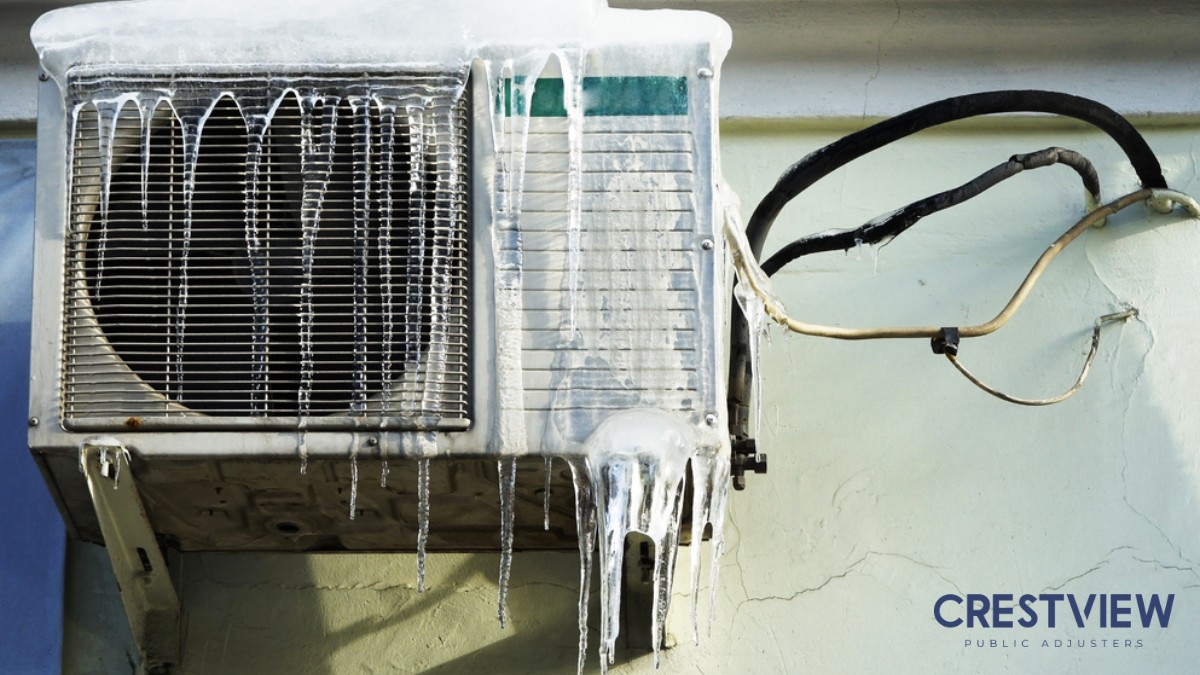Key Points:
- A frozen pipe to your AC unit can cause serious damage and disrupt cooling efficiency.
- Common causes include low refrigerant levels, poor airflow, and extreme cold weather.
- Quick fixes involve turning off the AC, increasing airflow, and checking refrigerant levels, but long-term solutions may require professional assistance.
A frozen pipe to an AC unit happens when restricted airflow, low refrigerant, or extremely cold temperatures cause condensation on the pipes to freeze. This ice buildup blocks the normal function of the unit, leading to reduced cooling and potential system failure. Ignoring this issue can result in costly repairs, water damage, or even a complete AC breakdown.
Signs Your AC Pipes Are Freezing
It’s important to identify freezing pipes early to prevent severe damage. Look for these common warning signs:
- Visible ice on the refrigerant line or evaporator coil.
- Warm air from vents instead of cool air.
- Unusual noises like hissing or bubbling.
- Increased humidity inside your home.
- Water leakage around the indoor unit due to melting ice.
If you notice any of these signs, act fast to avoid further damage to your AC system.
Immediate Steps to Fix a Frozen AC Pipe
Before calling a professional, try these immediate solutions:
1. Turn Off Your AC
Letting the unit continue running with frozen pipes can cause severe compressor damage. Shut off the AC and switch the fan to “ON” to help thaw the ice faster.
2. Increase Airflow
A blocked or dirty air filter can restrict airflow, leading to freezing. Replace or clean the air filter and open all vents in your home to allow proper circulation.
3. Check for Refrigerant Issues
Low refrigerant levels can cause freezing. While homeowners can’t refill refrigerant themselves, noticing a drop in cooling efficiency is a sign that a technician should inspect for leaks.
4. Ensure Proper Insulation
If the pipe leading to your AC unit is exposed to extreme cold, insulating it can prevent future freezing. Foam pipe insulation is a quick and affordable fix.

Long-Term Solutions to Prevent Frozen AC Pipes
Fixing the immediate problem is important, but preventing it from happening again will save you time and money in the long run.
1. Schedule Regular AC Maintenance
Routine maintenance helps detect potential issues before they cause major problems. An HVAC technician will check refrigerant levels, clean coils, and inspect the blower motor to ensure optimal performance.
2. Improve Indoor Airflow
Blocked vents, closed registers, or dirty ductwork can lead to frozen AC pipes. Keep vents open, clean ducts annually, and ensure furniture doesn’t block airflow.
3. Monitor Outdoor Temperatures
If you’re running the AC when outside temperatures drop too low (below 60°F), it can cause freezing. Use a smart thermostat to prevent the system from overworking in cold conditions.
4. Address Refrigerant Leaks Promptly
If your system is low on refrigerant, it’s likely due to a leak. Ignoring this issue can damage the compressor, leading to expensive repairs. A professional should locate and seal leaks as soon as possible.
When to Call a Professional
Some AC freezing issues require expert repair. Call an HVAC technician if:

Protect Your Home with Public Adjusters
A frozen pipe to your AC unit isn’t just an HVAC issue—it can lead to significant water damage, requiring an insurance claim. That’s where Crestview comes in. As experienced public adjusters in New York, New Jersey, and Florida, we help homeowners maximize their claims for frozen pipe damage. We handle the paperwork, negotiate with insurers, and ensure you get the compensation you deserve.
Don’t let a frozen pipe drain your finances—contact Crestview today!

